calsfoundation@cals.org
Bill Fulbright (1905–1995)
aka: James William Fulbright
aka: J. William Fulbright
James William (Bill) Fulbright remains one of Arkansas’s most well-known political figures. Like his Oxford University tutor, R. B. McCallum, Fulbright believed that a “Parliament of Man” was possible and that educated, enlightened human beings were able to recognize that their individual interests were inextricably bound up with the well-being of the community. The crux of that education was knowledge about and appreciation of other cultures, which in turn would breed tolerance, peaceful coexistence, respect for human rights, and collective security. To this end, as a U.S. senator, he sponsored the Fulbright Exchange Program and opposed foreign policy isolationists. He also led Senate opposition to the Vietnam War.
Bill Fulbright was born on April 9, 1905, in Summer, Missouri, to Jay and Roberta Fulbright. In 1906, the family moved to Fayetteville (Washington County), where his father developed a business empire that included a bank, a bottling company, a lumberyard (which later grew into Fulbright Industries), and the local newspaper. His mother was a civic leader. After his father’s death in 1923, Fulbright’s mother also became a businesswoman and newspaper editor. As a journalist, she gained a good deal of political power.
Fulbright attended the University of Arkansas (UA) in Fayetteville from the time he enrolled in the experimental kindergarten run by the College of Education until his graduation with a bachelor of arts degree in history in 1925.
In the fall of 1925, he enrolled at Oxford University in England, having been awarded a Rhodes scholarship. After graduating from Oxford with a BA in 1928, he met journalist M. W. Fodor in Vienna and accompanied him in the spring of 1929, touring southeastern and central Europe and meeting with leading politicians. He received an MA from Oxford in 1931.
During a business trip to Washington DC, Fulbright met Elizabeth Kremer Williams. They were married on June 15, 1932, and the couple had two daughters.
Fulbright received a law degree from George Washington University in 1934 and was admitted to the bar of the District of Columbia in the same year. He worked as an attorney in the Department of Justice Anti-Trust Division from 1934 to 1935, when the National Recovery Administration for which he worked was declared unconstitutional. At that point, he took a position teaching at George Washington University and, in 1936, began teaching at the University of Arkansas School of Law. While at UA, he and his family lived at Rabbit Food Lodge in nearby Springdale (Washington and Benton counties).
In 1939, Fulbright was named president of UA. At thirty-four, he was the youngest college head in the United States. His selection probably had more to do with his mother’s substantial political clout than with his academic and administrative record. When Homer Adkins, whom the Fulbright-owned newspaper had bitterly opposed, became governor of Arkansas in 1941, he packed the university’s Board of Trustees and had Fulbright removed from his position.
In 1942, Fulbright ran successfully for U.S. House of Representatives as a Democrat from the district comprising northwestern Arkansas. His time at Oxford studying modern European history and his travels in Europe had generated a deep interest in international affairs. Soon after his election, he made a name for himself by cosponsoring the Fulbright-Connally Resolution that supported membership in a post-war collective security organization that became the United Nations.
In 1944, he captured the Senate seat held by Hattie Caraway, beating the incumbent and two other candidates, including his nemesis, Homer Adkins.
In 1946, he sponsored legislation creating the Fulbright Exchange Program to foster international understanding among college students and prepare them to pursue enlightened foreign policies as political leaders. The bill called for the use of proceeds from the sales of surplus war property to fund the “promotion of international good will through the exchange of students in the fields of education, culture, and science.” On August 1, 1946, legislation best known as the Fulbright Act was passed and signed by President Harry S. Truman into law. Fulbright said, “If large numbers of people can learn to know and understand people from nations other than their own, they might develop a capacity for empathy, a distaste for killing other men, and an inclination for peace.” By 2025, the Fulbright Program had produced more than 400,000 Fulbright scholars from the United States and some 160 other countries. In June 2025, all but one member of the Fulbright Program’s twelve-person board resigned, in response to what they argued was political interference by the Donald Trump administration.
Fulbright gained national attention by challenging and eventually helping to censure Wisconsin Senator Joseph McCarthy. Fulbright was the only senator to vote against appropriations for McCarthy’s Senate Permanent Investigative Subcommittee, and he helped put together the bipartisan coalition in Congress that eventually condemned McCarthy on December 1, 1954. Fulbright was also responsible for what became called the Fulbright Memorandum, a critique of the right-wing National Education Program and the use of its materials to indoctrinate members of the U.S. military.
While Fulbright worked on behalf of Arkansas agriculture and industry, his most notable service was as the chair of the Senate Foreign Relations Committee, a post he held from 1959 to 1975—longer than any other chair of that committee in history. During this time, he supported the Truman Doctrine, the Marshall Plan, and NATO, and he defended executive prerogatives in foreign policy against isolationists who wanted to retreat within Fortress America. With his support, the Truman administration formulated and implemented the policy of containment, intervening on the side of the pro-western monarch in the Greek civil war and helping both Turkey and Iran fend off Soviet efforts to convert them into protectorates.
He came to be known for his advocacy of a land-for-peace settlement to the Arab-Israeli conflict and his support of détente with the Soviet Union. But he is probably best known for his opposition to the Vietnam War.
In February 1966, under Fulbright’s leadership, the committee held televised hearings on the war. The misgivings expressed there began the national debate on the wisdom of U.S. policy toward Southeast Asia. From then until the end of Lyndon Johnson’s term as president, Fulbright worked to dismantle support for the war. In 1967, he published The Arrogance of Power, a sweeping critique of American foreign policy that sold 400,000 copies.
In 1956, Fulbright signed the Southern Manifesto, a call by Southern representatives and senators for resistance to court-ordered school integration, and he did not vote for a civil rights bill until 1970. And yet he reportedly had played a key role in toning down the Southern Manifesto and, deeply affected by the killing of four Black girls in the Birmingham church bombing of 1963, he provided behind-the-scenes help on civil rights measures to both the Kennedy and Johnson administrations. During Nixon’s tenure in office, Fulbright led the way in defeating the nomination of G. Harrold Carswell, an outspoken opponent of the civil rights movement. He split with other Southern senators and voted to confirm Thurgood Marshall, the first Black justice of the U.S Supreme Court, and was one of twenty-six senators—the only Southerner—to vote not to confirm Nixon’s nomination of William Rehnquist for justice of the Supreme Court. During the confirmation hearings, an old memorandum surfaced that Rehnquist, a law clerk for Justice Robert Jackson, had written for his boss when the Supreme Court was deciding Brown v. Board of Education, the monumental 1954 school integration case. The memo seemed to argue for upholding the separate-but-equal doctrine of Plessy v. Ferguson in 1896. Rehnquist’s limp explanation was that he had meant only to lay out one of several options for Jackson in the Brown case. Twenty-five other Democrats and Republicans, from the liberal wings of their parties, joined Fulbright. He also combated the John Birch Society, the Christian Anti-Communist Crusade, H. L. Hunt, Strom Thurmond, and the other organizations and personalities that made up the radical right of the period.
After Richard Nixon’s election to the presidency, Fulbright used the U.S. Constitution as a rallying point to align conservatives and liberals behind his national commitments resolution that required explicit congressional approval for an executive commitment of aid or troops to a foreign power. Its passage in 1969 paved the way for the War Powers Act of 1973, which clarified the respective powers of the Congress and the presidency in declarations of war and deployment of troops.
Fulbright lost his U.S. Senate seat to Arkansas governor Dale Bumpers in 1974; for the next twenty years, he played the role of elder statesman, addressing the world from his office in the Washington DC law firm of Hogan and Hartson. In 1981, the UA College of Arts and Sciences was named for him, and in 1993, President William Jefferson Clinton, one of Fulbright’s proteges, presented him with the Medal of Freedom.
Betty Fulbright died in 1985 of congestive heart failure and complications from diabetes. In 1990, Fulbright married Harriet Mayor, then the executive director of the Fulbright Alumni Association. Following a massive stroke, Fulbright died on February 9, 1995, at his home in Washington. He is buried in Evergreen Cemetery in Fayetteville. A statue of him was dedicated on the UA campus in 2002.
The themes that more than any other dominated Fulbright’s public life and work were cultural tolerance and international cooperation. During his thirty-two years in Congress, the former Rhodes scholar appealed to the peoples of the world but particularly his countrymen to appreciate and tolerate other cultures and political systems without condoning armed aggression or human rights violations.
However, in the twenty-first century, his legacy has become increasingly contentious, especially in the wake of the Black Lives Matter movement, which drew attention not only to present-day police violence but also to a public memorial landscape honoring supporters of segregation. The Black Student Caucus in June 2020 circulated a petition calling for the removal of the statue of Fulbright, as well as the removal of his name from the College of Arts and Sciences. On April 28, 2021, a committee composed of UA students, faculty, staff, and alumni also recommended the removal of the Fulbright statue and its relocation to a place where it could be properly contextualized, as well as the renaming of the College of Arts and Sciences. The University of Arkansas System Board of Trustees voted on July 28, 2021, to keep the name of the Fulbright College, as well as to keep the statue, with the addition of context to illustrate Fulbright’s “complex legacy.”
For additional information:
Adame, Jaime. “Fulbright Statue, Designation at UA Need to Go, Panel Says.” Arkansas Democrat-Gazette, April 29, 2021, pp. 1A, 8A. Online at https://www.arkansasonline.com/news/2021/apr/29/fulbright-statue-designation-at-ua-need-to-go/ (accessed July 29, 2021).
———. “Fulbright’s UA Statue to Stay, Put in Context.” Arkansas Democrat-Gazette, July 29, 2021, pp. 1A, 7A. Online at https://www.arkansasonline.com/news/2021/jul/29/fulbrights-ua-statue-to-stay-put-in-context/ (accessed July 29, 2021).
Badger, Tony. “‘The Forerunner of Our Opposition’: Arkansas and the Southern Manifesto of 1956.” Arkansas Historical Quarterly 56 (Autumn 1997): 353–360.
Becnel, Thomas A. “Fulbright of Arkansas v. Ellender of Louisiana: The Politics and Sugar and Race, 1937–1974.” Arkansas Historical Quarterly 43 (Winter 1984): 289–303.
Berman, William C. William Fulbright and the Vietnam War: The Dissent of a Political Realist. Kent, OH: Kent State University Press 1988.
Brogi, Alessandro, Giles Scott-Smith, and David J. Snyder, eds. The Legacy of J. William Fulbright: Policy, Power, and Ideology. Lexington: University Press of Kentucky, 2019.
Brown, Eugene. J. William Fulbright: Advice and Dissent. Iowa City: University of Iowa Press, 1985.
Day, John Kyle. The Southern Manifesto: Massive Resistance and the Fight to Preserve Segregation. Jackson: University of Mississippi Press, 2014.
Dumas, Ernie. “Memorializing Fulbright.” Arkansas Times, August 2021, pp 18, 19–21.. Online at https://arktimes.com/columns/ernest-dumas/2021/07/27/memorializing-fulbright (accessed July 27, 2021).
Gibbons, William Conrad. The U.S. Government and the Vietnam War: Executive and Legislative Roles and Relationships. Princeton, NJ: Princeton University Press 1984.
“A History of the Fulbright Program.” U.S. Department of State, Bureau of Educational and Cultural Affairs. https://eca.state.gov/fulbright/about-fulbright/history (accessed June 12, 2025).
“J. William Fulbright.” University of Arkansas Fulbright College of Arts & Sciences. https://fulbright.uark.edu/deans-office/about-the-college/j-william-fulbright.php (accessed December 3, 2021).
J. William Fulbright Papers. Special Collections. University of Arkansas Libraries, Fayetteville, Arkansas.
Johnson, Haynes, and Bernard M. Gwertzman. Fulbright: The Dissenter. Garden City, NY: Doubleday Co., 1968.
King, Charles. “The Fulbright Paradox.” Foreign Affairs (July/August 2021). https://www.foreignaffairs.com/articles/united-states/2021-06-18/fulbright-paradox (accessed December 6, 2021).
Lazarowitz, Arlene. “A Southern Senator and Israel: Senator J. William Fulbright’s Accusations of Undue Influence over American Foreign Policy in the Middle East.” Southern Jewish History 14 (2011): 119–154.
O’Grady, Joseph Patrick. “J. W. Fulbright and the Fulbright Program in Ireland.” Arkansas Historical Quarterly 47 (Spring 1988): 47–69.
Pierce, Michael. “How to Win a Seat in the U.S. Senate: Carl Bailey to Bill Fulbright, October 20, 1943.” Arkansas Historical Quarterly 76 (Winter 2017): 334–361.
Powell, Lee Riley. J. William Fulbright and America’s Lost Crusade: Fulbright’s Opposition to the Vietnam War. Little Rock: Rose Publishing Company, 1984.
Powell, Lee Riley, with James O. Powell. J. William Fulbright and His Time. Memphis, TN: Guild Bindery Press, 1996.
Smith, Harold T. “J. William Fulbright and the Arkansas 1974 Senatorial Election.” Arkansas Historical Quarterly 44 (Summer 1985): 103–117.
Smith, Mitchell. “Woes of the Arkansas Internationalist: J. William Fulbright, the Middle East, and the Death of American Liberalism.” MA thesis, University of Arkansas, 2013. Online at https://scholarworks.uark.edu/etd/773/ (accessed July 6, 2022).
Sobers, Candance. “J. William Fulbright, the Contested Legacies of the American Revolution, and the War in Vietnam.” Modern American History 3 (March 2020): 27–45.
Syrtsova, Yekaterina. “J. William Fulbright and the Rhetorical Dimensions of His 1942 Congressional Campaign.” Flashback 64 (Spring 2014): 3–26.
Woods, Randall Bennett. “Dixie’s Dove: J. William Fulbright, the Vietnam War and the American South.” Journal of Southern History 60 (August 1994): 533–552.
———. Fulbright: A Biography. New York: Cambridge University Press 1995.
Randall Bennett Woods
University of Arkansas, Fayetteville
Rebecca Haden
Fayetteville, Arkansas


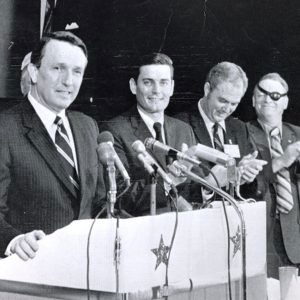 Bumpers Addressing Democratic Convention
Bumpers Addressing Democratic Convention 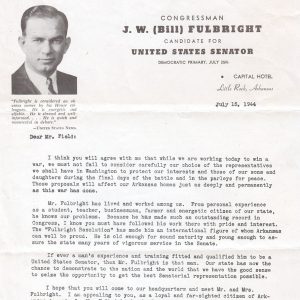 Fulbright Campaign Letter
Fulbright Campaign Letter 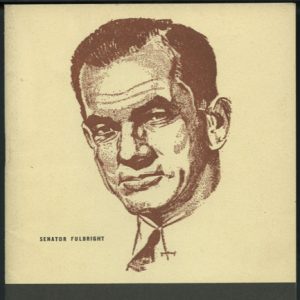 Fulbright Sketch
Fulbright Sketch 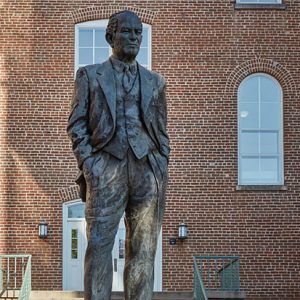 Fulbright Statue
Fulbright Statue 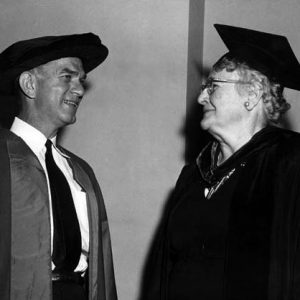 Bill Fulbright
Bill Fulbright 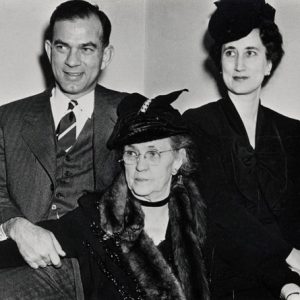 Bill, Roberta, and Elizabeth Fulbright
Bill, Roberta, and Elizabeth Fulbright  Fulbright Campaign Button
Fulbright Campaign Button 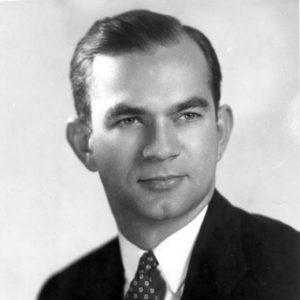 Bill Fulbright
Bill Fulbright 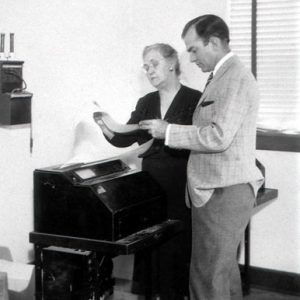 Roberta and Bill Fulbright
Roberta and Bill Fulbright 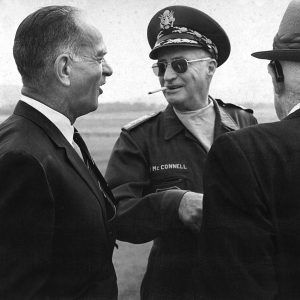 John Paul McConnell
John Paul McConnell  Peace Fountain
Peace Fountain 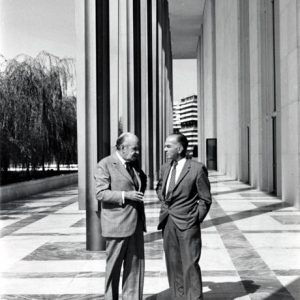 Edward Stone and J. William Fulbright
Edward Stone and J. William Fulbright 




Comments
No comments on this entry yet.